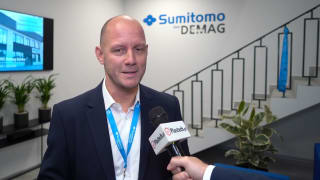Flexible adaptability
For many companies in the composites industry, the trend towards thermoplastic materials means they have to deal with completely new processes. It is also the first injection moulding machine for the NCC. Engel supplied a duo 1700 large-scale machine including a Kuka articulated arm robot and an integrated infrared oven. "Many of the well-known automotive manufacturers and Tier suppliers have duo machines in their plants, and our partner institutes in the USA and Japan also work with this type of machine," says Gallen about the crucial point of relying on Engel’s technology and knowhow likewise. A second criterion was the flexibility offered by the Engel system solutions. The wide range of applications resulting from NCC research projects and company cooperation requires that the manufacturing cell can be adapted to new requirements, new materials and new technologies within a short time.With a clamping force of 17,000 kN, the duo injection moulding machine is suitable for large components. In order to have a practical approach to development, the demonstrator moulds are based on the geometries of real car components. The sample parts have different sizes and complexities. So far, mainly organo sheets have been processed. These are heated in the infrared oven, inserted into the mould by the robot, formed there and then immediately overmoulded with plastic. "The fact that the infrared oven is located above the clamping unit simplifies handling and reduces the cycle time," reports Gallen.
Further developments focus on unidirectional (UD) fibre-reinforced tapes. With the help of these UD tapes, highly stressed areas in the component can be specifically reinforced in order to make even better use of the lightweight construction potential. "Today, the NCC is already a leader in the field of automated fibre laying, so the transition to UD tapes is not too far," says Gallen. With three differently dimensioned tape layup cells, the NCC is well equipped to produce the layups on site and process them further in an integrated process.
From product design to recycling
The NCC is an integrated factory, all processes can be developed and optimised in the overall context – from material development to simulation, design and processing to recycling. "The interfaces are particularly important when it comes to composites," explains Sean Cooper, Principle Research Engineer at the NCC. "In no other area are material, design and processing processes so closely intertwined. If you change only one of these three factors, you end up with a completely different result." It is also important for subsequent recycling to set the course already during product and process development. NCC is working with industrial partners on initial projects to develop value-adding recycling concepts. "The aim, for example, is to give safety-relevant components made of long-fibre-reinforced materials a second life as a bench or instrument panel based on materials reinforced with short fibres," says Gallen.NCC developers have carried out many series of tests right from the start with materials typical of the automotive industry, primarily from the PA family, as well as with the high-performance plastics PEEK and PPS, which are preferably used in aircraft construction. "Over the last two years, the aircraft industry has been working intensively on what thermoplastic composites can do for them," reports Gallen. "The switch to thermoplastics often leads to a massively smaller CO2 footprint." It all starts with high-volume applications, which also certainly exist in aircraft construction. Fastening elements such as brackets, for example, which hitherto consist of aluminium. "At the end of the day, composites always compete with steel or aluminium," says Paul Gallen. "Composites can only be used if the parts are even lighter, the unit costs even lower and the production processes even more efficient. Our goal is to additionally obtain even better component properties."
Quelle: Engel




